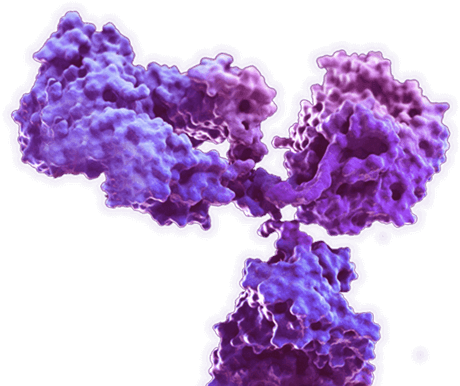Mouse Anti-Pig CD276 Antibody (MO-AB-24443R)
Cat: MO-AB-24443R
Certificate of Analysis Lookup
To download a Certificate of Analysis, please enter a lot number in the search box below. Note: Certificate of Analysis not available for kit components.
Lot Number
To download a Certificate of Analysis, please enter a lot number in the search box below. Note: Certificate of Analysis not available for kit components.
Lot Number
| Size: | |
| Conjugate: | |
| Inquiry |
- Product Details
- Relate Reference Data
Specifications
| Host species | Mouse (Mus musculus) |
| Species Reactivity | Pig (Sus scrofa) |
| Clone | MO24443R |
| Specificity | This antibody binds to Pig CD276. |
| Format | Liquid or Lyophilized |
| Storage | Store at 4°C: short-term (1-2weeks) Store at -20°C: long-term and future use |
| Purity | > 90% was determined by SDS-PAGE |
| Purification | Purified with Protein A or G affinity chromatography |
Application Information
| Application | WB, ELISA |
| Application Notes | ELISA: 1:1000-1:3000 Other applications are to be developed. The optimal dilution should be determined by the end user. |
Target
| Introduction | Members of the B7 superfamily co-stimulate lymphocyte proliferation during the initiation and maintenance of antigen-specific humoral and cell-mediated immune responses. B7-H3 (CD276) is a newly discovered member of the B7 superfamily. B7-H3 has been shown to play an important role in regulating T-cell responses in humans and mice, but it is unknown whether there are human or mouse B7-H3 counterparts in porcine species. |
| Product Overview | This product is a mouse antibody against CD276. It can be used for CD276 detection in Western Blot, Enzyme-Linked Immunosorbent Assay. |
| Alternative Names | CD276 molecule tv1; CD276 |
| UniProt ID | M3VK17 |
| Protein Refseq | The length of the protein is 534 amino acids long. The sequence is show below: MCQLGSRRVHVATILGLLWFCLTDAAVEVRVPEDPVVALVGTDATLRCSFSPGPSFSLAQLNLIWQLTDTKQLVHSFAEGRDQGSAYANRTTLFPDLLAQGNASLRLQRVRVADEGSFTCLVSIRDLDSSSAAVSLQVAAPYSKPSMTLEPNKDLRPGDTVTITCSSYRGYPEAEVFWQDGQGAPLTSNVTTSQMANEQGLLDARSVLRVVLGANGTYSCLVRNPVLQQDAHSSITITPHRSPTGAVEVQVPEDPVVALVGTDATLRCSFSPEPGFSLAQLNLIWQLTDTKQLVHSFAEGRDQGSAYANRTTLFPDLLAQGNASLRLQRVRVADEGSFTCFVSIRDFGSAAVSLQVAAPYSKPSMTLEPNKDLRPGDTVTITCSSYRGYPEAEVFWQDGQGAPLTGNVTTSQMANEQGLFDVRSVLRVVLGANGTYSCLVRNPVLQQDAHGSVTITGQPMTFPPEALWVTVGLSICLVALLVALAFVCWRKIKQSCEEENAGAEDQDGDGEGSKTALRPLKHSESKEEDGPEIA. |
Reference
| Reference | 1. Chen, W., Hou, Z., Li, C., Xiong, S., & Liu, H. (2011). Cloning and characterization of porcine 4Ig-B7-H3: a potent inhibitor of porcine T-cell activation. PLoS One, 6(6), e21341. 2. Wu, K. C., Chang, Y. H., Liu, H. W., & Ding, D. C. (2019). Transplanting human umbilical cord mesenchymal stem cells and hyaluronate hydrogel repairs cartilage of osteoarthritis in the minipig model. Tzu-Chi Medical Journal, 31(1), 11. |
See other products for " Cd276 "
| MO-AB-09804R | Mouse Anti-Cattle Cd276 Antibody (MO-AB-09804R) |
| MO-AB-01558W | Mouse Anti-Rhesus CD276 Antibody (MO-AB-01558W) |
| CBMOAB-38681FYA | Mouse Anti-Rhesus CD276 Antibody (CBMOAB-38681FYA) |
| MO-AB-52551W | Mouse Anti-Marmoset CD276 Antibody (MO-AB-52551W) |
| CBMOAB-69677FYA | Mouse Anti-Zebrafish cd276 Antibody (CBMOAB-69677FYA) |
| MO-AB-20211W | Mouse Anti-Chimpanzee CD276 Antibody (MO-AB-20211W) |

Figure 1 Distribution and analysis of the porcine B7-H3. Dot-blot hybridization assay of mRNA from different tissues using the probes of 4Ig-B7-H3. Samples of PBMCs, PAM, heart, liver, spleen, lung, kidney, brain, lymph nodes, small intestine, tonsil were loaded from dot 1 to 11, respectively, with positive control (dot 12) and negative control (dot 13). The upper and lower panels were B7-H3 and β-actin, respectively.

For Research Use Only | Not For Clinical Use.
Online Inquiry

